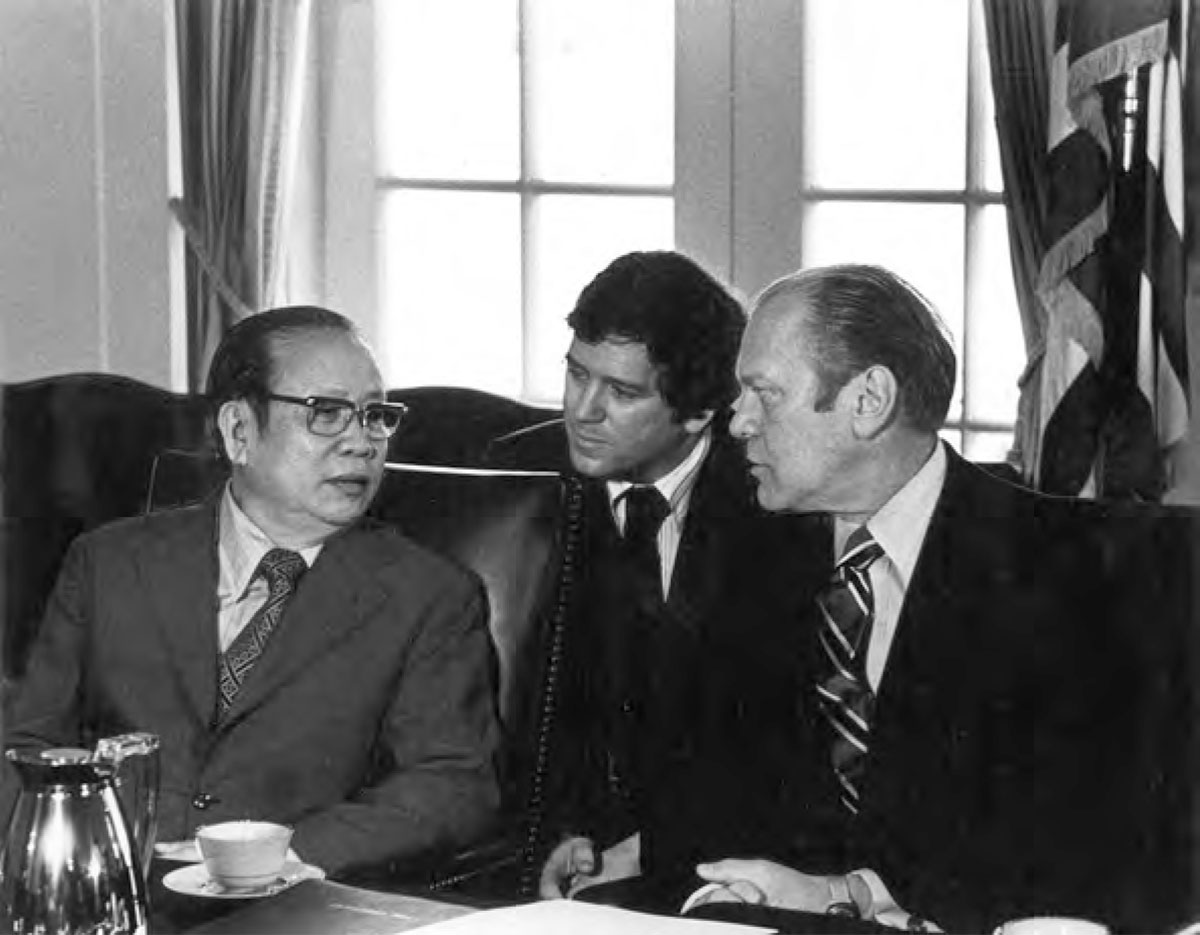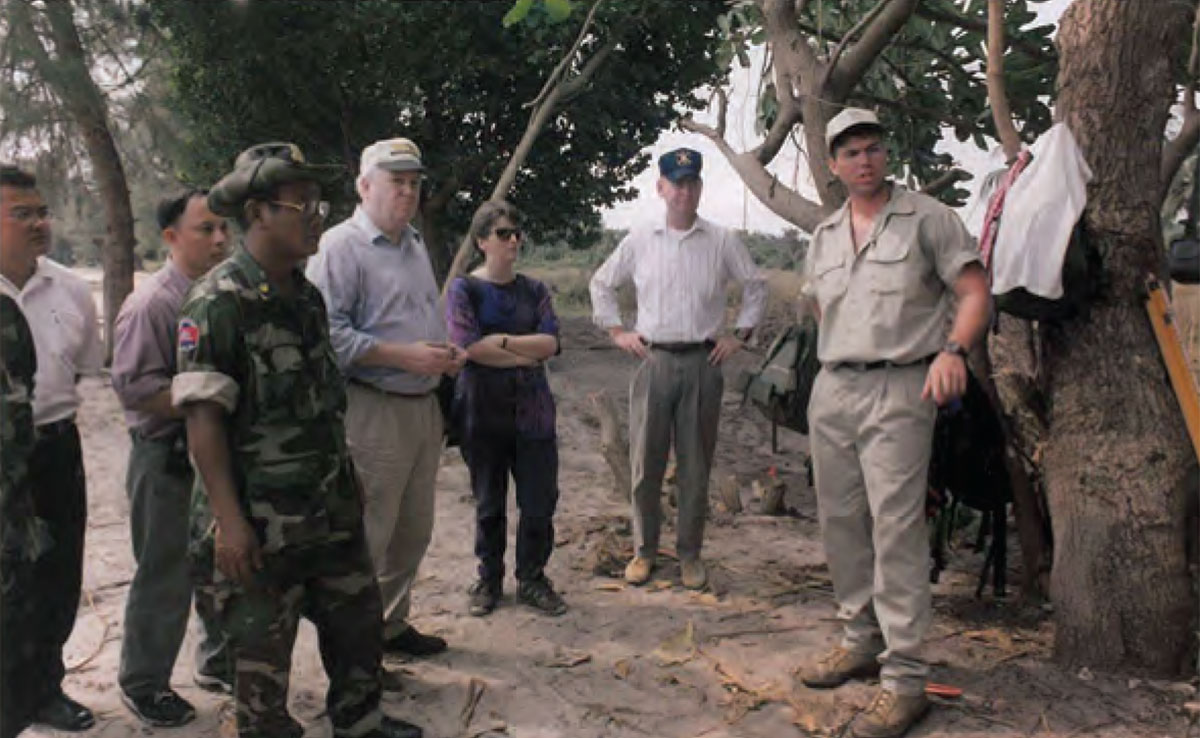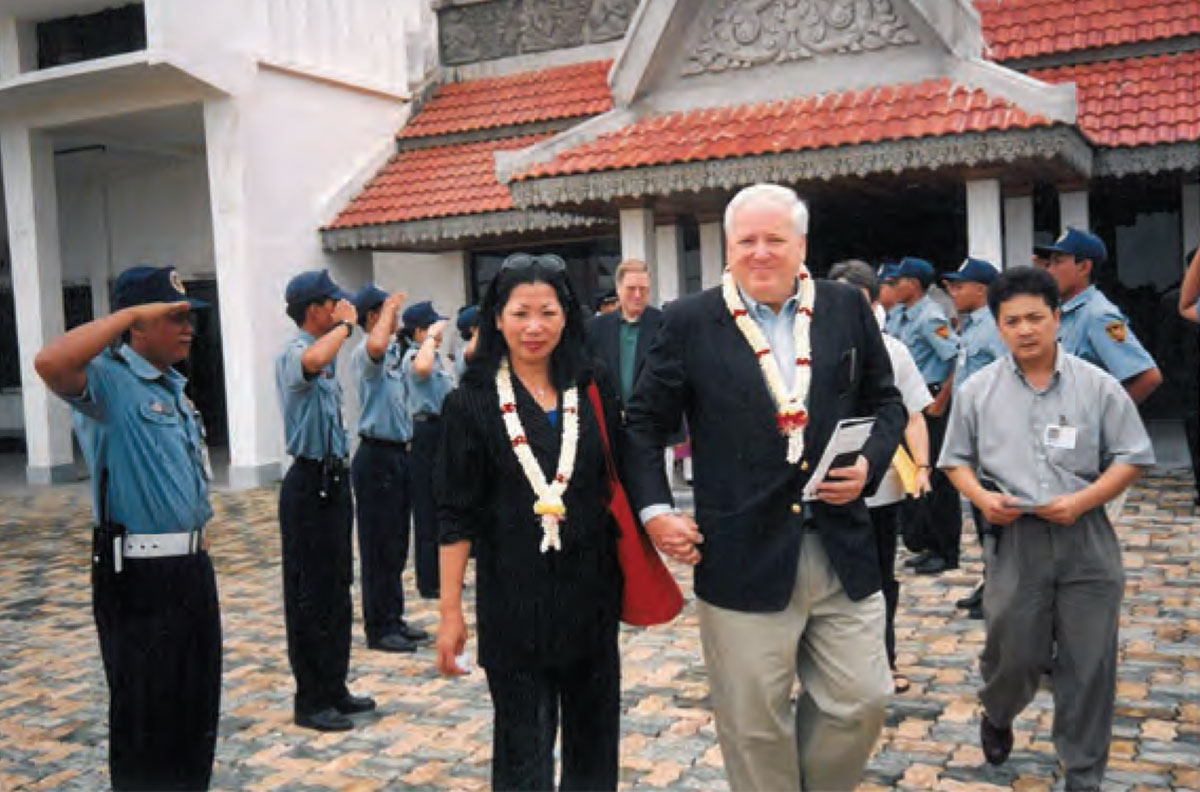Integrity and Openness: Requirements for an Effective Foreign Service
Honesty and candor have been the watchwords of this three-time AFSA dissent award winner’s diplomatic career.
BY KENNETH M. QUINN

Kenneth Quinn, center, serving as President Gerald Ford’s interpreter at a meeting with a South Vietnamese government delegation at the White House in April 1975, a few weeks before the fall of Saigon.
The White House
From the very start of my 32-year Foreign Service career, through one of my final actions as chief of mission in Phnom Penh, constructive dissent has been integral to most positions I have held and decisions I had to make. While my willingness to challenge U.S. policy on issues ranging from genocide and terrorism to normalizing relations with Vietnam may have cost me a job or two along the way, the respect of my fellow officers and the three awards for constructive dissent AFSA has conferred on me motivated me to keep speaking up.
My first experience as a dissenter occurred in 1968. After completing the A-100 course, I had moved on to the Vietnam Training Center to prepare for my first assignment in that wartorn country. This was shortly after the Tet Offensive, which had claimed the lives of a number of Foreign Service officers, and amid growing doubt that our goals in Vietnam were “worth dying for.” In fact, several FSOs who had served there found the assignment so morally confounding that they either resigned or asked for reassignment just a few months after arriving “in country,” effectively ending their careers.
This trend understandably caused considerable concern among senior State Department officials, including the new director of the Vietnam Training Center, Cliff Nelson, who himself had just returned from the war. He spoke to the assembled trainees and urged anyone who had any doubts about what we were doing in Vietnam to come see him right away. Based on the conversations I’d had with my colleagues, I assumed that there would be a long line at his door, but I was the only one there.
When Nelson arrived, he looked at me and asked, “Who are you and what do you want?” I replied, “You just said that anyone with doubts should come to see you, and I wanted to be honest and tell you about mine.” This enraged him, and he went into a tirade, yelling that he could not understand why a “red-blooded American boy could not risk his life for his country.” As I sputtered out a few words, trying to tell him I was fully prepared to do just that, he yelled that he was throwing me out of the program and, if he could, out of the Foreign Service.
Suddenly, my dream of a career in diplomacy was about to disappear before it had even begun. But the department was so desperate for employees to serve in Vietnam that it ordered the director to reinstate me. Soon thereafter, I left for Saigon and ended up staying in Vietnam for six years, an experience that shaped my Foreign Service career.
Throughout the Vietnam War, many FSOs had difficulty getting their reporting telegrams approved and sent if they dared to express any doubts about U.S. policy.
Dinner with the Ambassador
I spent my first two years in Vietnam as a district senior adviser in Sa Đéc province, where I headed a 10-member U.S. Army advisory team and commanded combat helicopter missions. I was there at the same time as a young naval officer named John Kerry, who was assigned to a brown-water Navy patrol boat base.
At one point, a few officers from the field, including me, were asked to come to the embassy in Saigon to have dinner with Ambassador Ellsworth Bunker. It was a rare opportunity to interact with someone at such a high level. Over dinner, the ambassador asked us for assessments of how things were going in the countryside.
One by one, my colleagues gave relatively upbeat accounts. As the most junior person present, I was the last to speak, and I could feel the pressure to repeat their assurances of success. But instead, I described the significant corruption that pervaded the South Vietnamese government and military hierarchy, and explained how it was undercutting our efforts to defeat the insurgent Viet Cong.
Amb. Bunker’s face showed just how unhappy he was to hear what I had to say, but for good measure, he added: “That’s not what I hear from others.” Later in the evening, Deputy Chief of Mission Sam Berger pulled me aside and told me privately how glad he was that I said the things that I had, and how important it was for the ambassador to hear them.
Throughout the Vietnam War, many FSOs had considerable difficulty getting their reporting telegrams approved and sent if they dared to express any doubts about U.S. policy. This added to a sense of frustration and deep disappointment. I still recall walking down an alley in Saigon with another junior officer who was literally in tears. His vision of an honest, open Foreign Service reporting system had proven an illusion, and he was considering resignation.
I felt similar pressure two years later, in 1972, when I was stationed along the Vietnamese-Cambodian border. There I observed the very first steps by the radical Khmer Rouge as they began taking over parts of Cambodia. By interviewing refugees who fled across the border and carefully reviewing other reports, I pulled together the first-ever detailed account of the group’s genocidal policies, which they would later inflict on seven million Cambodians. My analysis also documented that the Khmer Rouge were not controlled by Hanoi, which was an article of faith within the U.S. government and intelligence community.
To his credit, the U.S. consul general in Cân Thö did not hesitate to send my well-documented report to Washington as an airgram, which received wide circulation. But the response from Embassy Phnom Penh was to tell me to desist from further reporting on Cambodia, and virtually every other analyst reacted by saying I had it all wrong. (Twenty-five years later, Henry Kissinger—who was the U.S. national security adviser when I submitted the report—pulled me aside at a reunion of National Security Council staffers to squeeze my arm and say he thought it was brilliant.)
The Foggy Bottom 46

Amb. Kenneth Quinn, fourth from left, on the ground in Cambodia during a POW/MIA search for evidence of missing U.S. servicemen. DCM Carol Rodley is to his left.
Embassy Phnom Penh
In April 1974, after six years in Vietnam, I was assigned to the staff of the National Security Council. This was just as Watergate was closing in on President Richard Nixon, and the “decent interval” before the collapse of South Vietnam was drawing to an end. Internal turmoil led to the creation of the Secretary’s Open Forum, of which I was one of the co-founders and vice chair. When we had our first meeting with Kissinger, now Secretary of State, you can imagine the startled look on his face when he realized that a member of the NSC staff was also leading this new organization.
Two years later, I became a special assistant to Richard Holbrooke, the new assistant secretary for East Asian and Pacific affairs. As much as I loved my job, many mid-level colleagues shared my dismay that seventh-floor political appointees were making policy and personnel decisions without any input from the career Foreign Service. A few of us began meeting in the EAP conference room to talk about the situation and how to rectify it.
In 1977, 46 of us (known as the “Foggy Bottom 46”) drafted and signed a statement of our concerns, which I hand-carried to Executive Secretary Peter Tarnoff along with a request to meet with Secretary of State Cyrus Vance. By the time the meeting was set up, more than 500 FSOs had signed the petition, including several sitting ambassadors and assistant secretaries.
On the day of the meeting, I served as spokesman, accompanied by George Moose, Barbara Bodine and Alan Romberg. After assuring Sec. Vance of our deep commitment to excellence in foreign affairs, we then conveyed our concern that this basic principle was being undermined and eroded. The Secretary was clearly taken aback by our candid outline of concerns, and immediately committed the department to a thorough review of every issue we identified.
Our initiative set off a chain reaction that helped pave the way for passage of the Foreign Service Act of 1980. It also led to my receiving the William R. Rivkin Award for constructive dissent by a mid-level FSO, in 1978, my first AFSA dissent award.
The response from Embassy Phnom Penh was to tell me to desist from further reporting on Cambodia.
Formulating a Road Map
In 1990 I returned to Washington from the Philippines to serve as a deputy assistant secretary in the Bureau of East Asian and Pacific Affairs. I also chaired the Interagency Committee on Vietnam POW/MIA Accounting. Opposition to moving forward on normalizing relations with Vietnam came from many directions. Many critics, including members of Congress, believed that the State Department and other federal agencies had suppressed information about U.S. military personnel left behind alive in Indochina.
At one point, I invited a group of about 30 of the most strident critics to the department. In fact, we gathered in the same EAP conference room where the Foggy Bottom 46 had met. I told them that I would stay as long as they wanted and would answer every question.
After more than two hours, when the group had no more questions to ask, one of them stood up and said, “This was the single best meeting we have had with a government official in the 18 years since the end of the war.” That remark brought home to me again how critical openness is to promoting trust in U.S. policy.
Despite that success, the leader of one POW/MIA family organization met privately with senior department officials to urge that I be removed as DAS. That campaign briefly succeeded, but as I was packing up my office, Under Secretary of State Frank Wisner reversed the decision.
The result was that over two administrations, from 1990 to 1994, I was able to help put in place the “Road Map Policy,” which provided for simultaneous steps by both Hanoi and Washington that led to significant progress in POW/MIA accounting, the establishment of liaison offices and, eventually, the normalization of relations. It was for my role in bringing about this transformation of U.S. policy, in the face of entrenched opposition and personal efforts to remove me, that I received AFSA’s Christian A. Herter Award for constructive dissent by a Senior FSO in 1993.
A Matter of Life and Death

Amb. Kenneth Quinn and his wife, Le Son, departing from Embassy Phnom Penh at the end of his ambassadorial tour in July 1999.
Embassy Phnom Penh
My last dissent came right at the end of my career in 1999, while serving as ambassador to Cambodia. We had a completely defenseless facility with no Marines, no setback and no way to prevent a truck bombing like the ones that had hit our missions in Nairobi and Dar es Salaam the year before. In fact, the Diplomatic Security Bureau’s Mobile Assessment Team said that Embassy Phnom Penh was the most exposed mission in the world; hit with an explosive like that used in Kenya, everyone inside would likely be killed or wounded.
Deputy Chief of Mission Carol Rodley and I began a desperate search for a new, safer location to which we could move our operations. However, Washington kept denying every application for funding or permission to relocate. The department finally ordered us to stop appealing the denials and to sign the waivers required for a security upgrade of our current location—the very one that DS itself had said could not be safeguarded.
In my judgment, agreeing to sign such waivers would leave all of my American and Cambodian employees exposed. I sent a message via the Dissent Channel informing Secretary of State Madeleine Albright that I refused to implement the department’s orders.
Since I was only a few months away from the end of my ambassadorial tour, I suspected Washington might try to wait me out. It was therefore critical that DCM Rodley sent her own, separate message, confirming that if I left post, she would also refuse to implement the directive. As a result of our united front, State ultimately came up with the funds to construct a new embassy with an appropriate setback and a detachment of Marine guards.
In 2000, Carol Rodley and I shared the Herter Award (my second) for our actions.
More than ever, our foreign policy needs Foreign Service members to speak candidly.
The Value of Dissent
I can attest to the fact that challenging U.S. policy from within is never popular, no matter how good one’s reasons are for doing so. In some cases, dissent can cost you a job—or even end a career. And even when there are no repercussions, speaking out may not succeed in changing policy.
Yet as I reflect on my 32 years in the Foreign Service, I am more convinced than ever how critically important honest reporting and unvarnished recommendations are. And that being the case, ambassadors and senior policy officials should treasure those who offer different views and ensure that their input receives thoughtful consideration, no matter how much they might disagree with it.
AFSA’s annual dissent awards are a powerful reminder of that responsibility. By recognizing and honoring Foreign Service personnel at all levels who demonstrate intellectual courage and integrity, this unique program reminds us that our foreign policy, more than ever, needs Foreign Service members to speak candidly, whether about personnel issues, war policy, terrorism or genocide.

